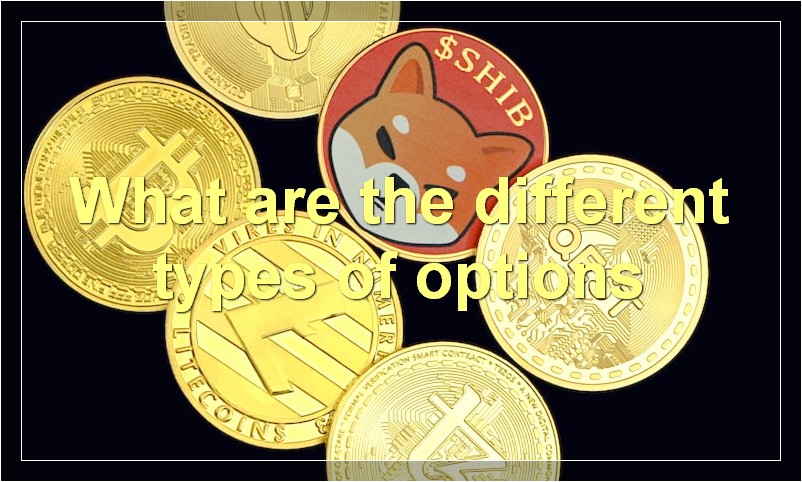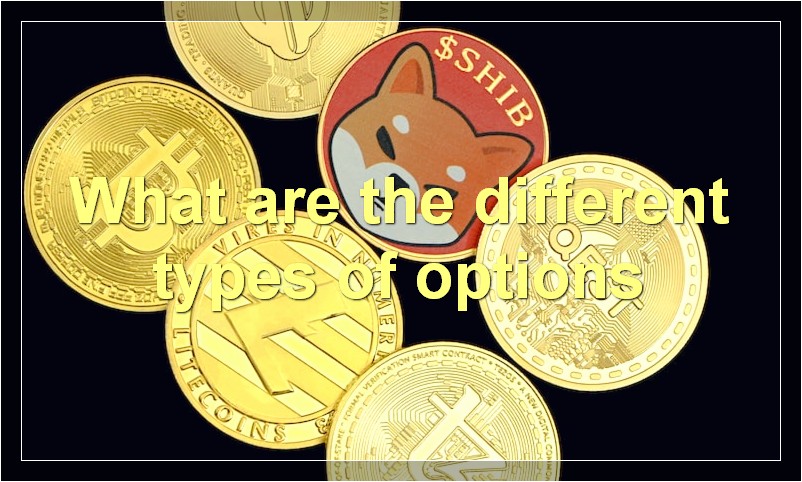If you’re looking to get started in options trading in India, this complete guide will tell you everything you need to know.
What is options trading
When it comes to trading, there are many different types of strategies that can be used. One such strategy is options trading. So, what is options trading?
In simple terms, options trading is a type of trading where you speculate on the future price of an asset, and take a position accordingly. If your prediction is correct, you can make a profit. However, if your prediction is incorrect, you will incur a loss.
There are two main types of options: call options and put options. Call options give you the right to buy an asset at a certain price, while put options give you the right to sell an asset at a certain price.
Options trading can be a great way to make money, but it does come with risks. Before you start options trading, it’s important to understand the risks involved and have a solid trading strategy in place.
What are the different types of options

There are two main types of options: call options and put options.
A call option gives the holder the right, but not the obligation, to buy an underlying asset at a specified price on or before a certain date. A put option gives the holder the right, but not the obligation, to sell an underlying asset at a specified price on or before a certain date.
The value of an option is determined by a number of factors, including the price of the underlying asset, the strike price of the option, the time remaining until expiration, and the volatility of the underlying asset.
What are the benefits of options trading
Options trading is a type of trading that allows investors to buy and sell options, which are contracts that give the holder the right to buy or sell an underlying asset at a specified price on or before a certain date. Options trading can be a lucrative way to make money, but it also carries with it a certain amount of risk.
There are two main types of options: call options and put options. Call options give the holder the right to buy an underlying asset at a specified price on or before a certain date. Put options give the holder the right to sell an underlying asset at a specified price on or before a certain date.
Options trading can be used to speculate on the future direction of a market, or to hedge against an existing position. For example, if you believe that a stock will go up in value, you could buy a call option. If the stock does indeed go up in value, you will make a profit. On the other hand, if you believe that a stock will go down in value, you could buy a put option. If the stock does indeed go down in value, you will again make a profit.
Options trading can be risky, but it can also be very profitable. It is important to understand the risks involved before getting started.
What are the risks of options trading
There are a number of risks associated with trading options. These include the risk of the underlying asset not moving in the direction you anticipate, the risk of not being able to close out your position when you want to, and the risk of losing more money than you have invested. Additionally, there is also the potential for fraud when trading options.
What is the best strategy for options trading
There is no one best options trading strategy. Each trader needs to find the approach that works best for them given their specific circumstances. Some factors that will affect your decision include your investment goals, risk tolerance, and time horizon.
Some common option strategies include buying calls, puts, or spreads. Calls give you the right to buy an asset at a certain price, puts give you the right to sell an asset at a certain price, and spreads involve buying and selling options with different strike prices.
Options can be used to speculate on the future direction of a market, or to hedge against downside risk in an underlying position. When used correctly, options can provide significant leverage and improve your chances of success in the markets.
What are the most popular options traded in India

The most popular options traded in India are those that are based on the country’s major stock indices, such as the Bombay Stock Exchange (BSE) 30 Index and the National Stock Exchange (NSE) Nifty 50 Index. These options are popular with investors because they offer a way to hedge against market volatility and also provide a means of profiting from price movements in either direction. Other popular options traded on Indian exchanges include individual stocks, commodities, and currency pairs.
What is the difference between options trading and stock trading
The world of investment and finance can be a confusing one, filled with jargon and seemingly complex concepts. For the average person on the street, trying to make sense of it all can be daunting. When it comes to trading stocks and options, there is often confusion as to what the differences are. In this article, we’ll take a look at the key differences between options trading and stock trading, in hopes of providing some clarity.
Stock trading refers to the buying and selling of shares in a company. When you buy shares in a company, you become a shareholder and have a claim on the company’s assets and profits. You also have voting rights at shareholder meetings. When you sell your shares, you are selling your ownership stake in the company.
Options trading, on the other hand, refers to the trading of options contracts. An option contract gives the holder the right, but not the obligation, to buy or sell an underlying asset at a specified price within a certain time period. Options are typically used as a way to hedge against risk or speculate on the future price movement of an asset.
So, what are the key differences between options trading and stock trading?
1. Options Trading is More Flexible Than Stock Trading
One of the key advantages of options trading is that it is much more flexible than stock trading. With stock trading, you are either buying or selling shares outright. With options trading, there are a variety of different strategies that can be employed, depending on your objectives.
2. Options Trading is More Risky Than Stock Trading
Another key difference between options trading and stock trading is that options trading is generally considered to be more risky than stock trading. This is because with options trading you are often leverage, meaning that you can control a large amount of an asset with a relatively small amount of capital. This leverage can magnify both profits and losses.
3. Options Trading Requires More Knowledge Than Stock Trading
Because of the increased flexibility and risk involved with options trading, it generally requires more knowledge and experience than stock trading. There are a variety of different factors that need to be considered when entering into an options trade, such as volatility, time decay, and implied volatility. As such, it is often recommended that new investors seek professional guidance before embarking on options trading.
4. Options Trading Can Be Used To Hedge Against Risk
One final key difference between options trading and stock trading is that options can be used to hedge against risk. By buying put options, for example, investors can protect themselves against downside risk in the underlying asset. This hedging capability is not available with stock trading.
So there you have it – some of the key differences between options trading and stock trading. Hopefully this has provided some clarity on the two different types of trades and their respective advantages and disadvantages.
What is the difference between options trading and futures trading
Futures and options are both types of derivative contracts that allow traders to bet on the future direction of an underlying asset, such as a stock, commodity, or currency. The key difference between futures and options is that futures contracts are obligated while options contracts are not. This means that if you buy a futures contract, you are required to take delivery of the underlying asset at the specified price and date. If you buy an options contract, however, you are not obligated to take delivery of the asset and can simply let the contract expire if you don’t want to exercise your option.
How do I start options trading in India
If you’re looking to start options trading in India, there are a few things you need to know. First, options trading is not for everyone. It’s important to understand the risks and rewards before getting started.
Second, there are a few different ways to trade options. The most common way is through a broker. You can also trade options through a few online platforms.
Third, when you’re ready to start trading, be sure to paper trade first. This will help you get a feel for the market and how to place trades. Once you’re comfortable, you can start trading with real money.
fourth, always remember that options trading is a risky business. There are no guarantees in the market. Be sure to use stop-loss orders and limit your risk.
fifth, have fun! Options trading can be a great way to make money. Just be sure to educate yourself before getting started.
What are some tips for successful options trading in India
Assuming you would like a summary of tips for successful options trading in India:
1. Do your research: It is important to be aware of the underlying asset before trading options. In India, options can be traded on indices, individual stocks, and futures. Do your research on these underlying assets and their historical volatility to help you make informed decisions when trading.
2. Be aware of the risks: Options trading is a risky business and it is important to be aware of the potential risks involved before putting any money down. Make sure you understand the different types of risks associated with options trading and know how to manage them.
3. Have a plan: Don’t just enter into an options trade without having a plan. You should have a clear idea of what your goals are and what you are willing to risk before entering into any trade. Otherwise, you may find yourself making reckless decisions that could end up costing you big time.
4. Use stop-loss orders: A stop-loss order is an order placed with a broker that instructs them to sell an asset once it reaches a certain price. This can help limit your losses if the market turns against you.
5. Stay disciplined: It can be easy to get caught up in the excitement of options trading, but it’s important to stay disciplined and stick to your plan. If you let emotions take over, you are more likely to make impulsive decisions that can lead to losses.

